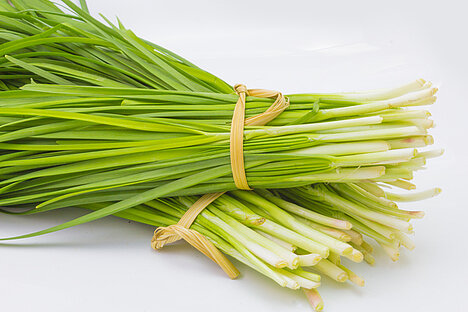Chives

What are chives?
Chives are a plant from the leek family, which also includes onions, garlic, leeks and wild garlic. It has long, thin, green stems that look like grass and often grow in clusters. The flowers are usually purple or pink and have a sweet scent.
Chives are mainly used as a spice as they have a mild onion flavor. It can be used fresh or dried and goes well with salads, soups, quark, eggs and potatoes. Chives contain many vitamins, minerals and antioxidants that are good for your dog's health.
Are chives poisonous for dogs?
Unfortunately, chives are not suitable for dogs. This is because they contain a substance called allium, a sulphur compound that is poisonous to dogs. Allium attacks the red blood cells of dogs and leads to their destruction. The result is anemia, which hinders the transport of oxygen in the blood. In addition, the breakdown products of the red blood cells can damage the kidneys.
The toxicity of chives depends on the amount a dog eats. Just 5 grams of chives per kilogram of body weight can lead to symptoms of poisoning. This corresponds to a medium-sized bunch of chives for a dog weighing 10 kilograms or a small handful for a cat weighing 4 kilograms.
It does not matter whether the chives are fresh, dried, powdered or cooked. In some forms it is even more dangerous, as the allium content is more concentrated. For example, one teaspoon of garlic powder is equivalent to eight cloves of fresh garlic.
What are the symptoms of chive poisoning in dogs?
The symptoms of chive poisoning can vary depending on the severity. They usually occur within 24 hours of consumption and can last for several days. The most common signs include
- Nausea and vomiting
- diarrhea
- loss of appetite
- Tiredness and weakness
- Shortness of breath and palpitations
- Pale or yellow mucous membranes
- Dark urine
If you suspect that your dog has eaten chives or is showing any of these symptoms, you should see a vet immediately. Do not try to help your dog yourself or give him home remedies. Your dog needs professional treatment to combat the poisoning and prevent possible consequential damage.
How can you protect your dog from chives?
The best prevention against chive poisoning is to prevent your dog from coming into contact with the herb in the first place. This means
- Keep chives out of your dog's reach.
- Do not give your dog food containing chives or other allium plants.
- Do not use chives or other allium plants as a home remedy for ticks, fleas or worms.
- Make sure that your dog does not nibble on chives or other allium plants in the garden or in nature.
If you grow chives in the garden, you should plant them in a fenced-off area or protect them with a fence or cover. If you take your dog for a walk, keep it on a lead or put a muzzle on it so that it doesn't eat the wrong things.
Chives are a tasty culinary herb for humans, but not for dogs. It contains a toxic substance that can damage the red blood cells and kidneys of dogs. The symptoms of chive poisoning are serious and can be life-threatening. You should therefore keep your dog away from chives and take him to the vet immediately if he has eaten them.
If you notice any signs of hypersensitivity or poisoning in your dog, you should see your vet immediately. We are not a substitute for a vet, but we try to be as accurate as possible. Every dog reacts differently and we recommend you get a second opinion or consult your vet if in doubt.
Stay healthy and take good care of your four-legged friend!😊